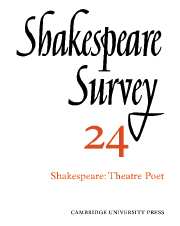Book contents
- Frontmatter
- Hearing Shakespeare: Sound and Meaning in ‘Antony and Cleopatra’
- ‘More Pregnantly Than Words’: Some Uses and Limitations of Visual Symbolism
- Shakespeare and the Limits of Language
- Revenge, Retribution, and Reconciliation
- Shakespeare the Professional
- Shakespeare’s Talking Animals
- The Morality of ‘Love’s Labour’s Lost’
- Shakespeare’s ‘Earth-treading Stars’: the Image of the Masque in ‘Romeo and Juliet’
- ‘Hamlet’ and the ‘Sparing Discoverie’
- ‘Hamlet’ in France 200 Years Ago
- The Hamlet in Henry Adams
- ‘Pericles’ and the Dream of Immortality
- A Necessary Theatre: The Royal Shakespeare Season 1970 Reviewed
- Free Shakespeare
- The Year's Contributions to Shakespearian Study 1 Critical Studies
- 2 Shakespeare’s Life, Times, and Stage
- 3 Textual Studies
- Index
- Plate section
The Morality of ‘Love’s Labour’s Lost’
Published online by Cambridge University Press: 28 March 2007
- Frontmatter
- Hearing Shakespeare: Sound and Meaning in ‘Antony and Cleopatra’
- ‘More Pregnantly Than Words’: Some Uses and Limitations of Visual Symbolism
- Shakespeare and the Limits of Language
- Revenge, Retribution, and Reconciliation
- Shakespeare the Professional
- Shakespeare’s Talking Animals
- The Morality of ‘Love’s Labour’s Lost’
- Shakespeare’s ‘Earth-treading Stars’: the Image of the Masque in ‘Romeo and Juliet’
- ‘Hamlet’ and the ‘Sparing Discoverie’
- ‘Hamlet’ in France 200 Years Ago
- The Hamlet in Henry Adams
- ‘Pericles’ and the Dream of Immortality
- A Necessary Theatre: The Royal Shakespeare Season 1970 Reviewed
- Free Shakespeare
- The Year's Contributions to Shakespearian Study 1 Critical Studies
- 2 Shakespeare’s Life, Times, and Stage
- 3 Textual Studies
- Index
- Plate section
Summary
Edward Dowden noted that the death of the Princess’s father at the end of Love’s Labour’s Lost gives the comedy a sour twist: “
It is a strange end for a comedy, and we can hardly doubt that Shakespeare’s meaning is this ― a true education is not to be attained by removing from the world into a region of fantastical culture, but by submitting to the complete discipline of both joy and sorrow. He does not preach a doctrine; but his view of life is embodied in his art.
In this connection the ending of the play is indeed significant. As Berowne complains:
Our wooing doth not end like an old play; Jack hath not Jill: these ladies' courtesy Might well have made our sport a comedy.
(v, ii, 864-6)The ending is not truly comic, with difficulties resolved and sins forgiven, but moralistic-punishments are meted out, nor is it clear that the eventual outcome will be a happy one.3 Shakespeare may not have the dramatic morality tradition of the Middle Ages directly in mind, but there is much in Loves Labour's Lost which is reminiscent of the morality plays. Thus the subject matter is shaped, often to the point of stylisation, round the development of a moral theme. The set scenes which make up much of the play are related to each other more by the theme than by the extremely tenuous plot.
- Type
- Chapter
- Information
- Shakespeare Survey , pp. 55 - 62Publisher: Cambridge University PressPrint publication year: 1971
- 1
- Cited by

